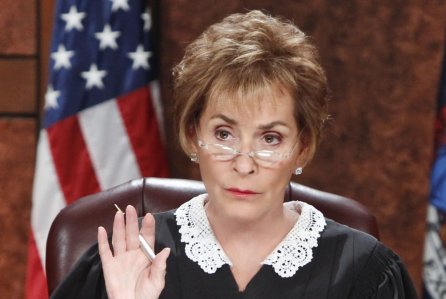How things work on a court TV show

I work on the Judge Judy Show, and a lot of my job consists of looking through small claims applications and then calling potential litigants for the show. In case you're wondering: Yes! They are real cases with real people. (Though I do what I can to tweak the reality to suit the viewers' pleasure.)
Some background: any time someone files a suit in small claims it becomes a public record. All of the court TV shows have researchers combing through those public records in districts across the country, and they send copies back to their respective production offices. Those claims get split amongst the producers in the office, and we send out letters and make calls.
You may be asking yourself: why would anyone want to come on national TV to talk about their "dirty laundry"? Honestly, the vast majority of people I talk to don't want to get anywhere near a camera. But the sad and surprising fact is that nearly 80% of court-ordered judgments go unpaid every year. That means you can sue someone in small claims, a judge can order that the defendant pays his debt, and five years later, all you've got for your trouble is a framed court-order on your wall.

Source
There are several case-types that are very common:
Landlord/Tenant - Either a tenant is suing a landlord because the security deposit was not returned, or a landlord is suing the tenant for unpaid rent or damages. These are by far the most common cases, and they are also the most boring. I generally try not to even contact these people. A more promising version of this is when roommates sue each other - here at least there is a potential for a relationship.
Unpaid personal loans - These are also quite common. These have the potential to be more interesting since personal loans will usually be between people with a relationship, which means there could be some interesting drama. Even so, the vast majority of them are so clear-cut that there's not enough to talk about that will last more than three minutes of airtime.
Dog bites - This kind of case is common, but much less so than the other two. These have potential, except that the majority occur because an owner did not have his dog properly leashed. And if that's the case, then that owner is automatically at fault, and there's nothing for him to argue. (And I'm sorry for any pit bull lovers out there, but a statistically relevant number of the cases that end up in the courts involve your breed.)

Source
- Other - It's usually in the "other" category where we find the most potential cases - these can be vandalism, assault, false restraining orders - all the interesting stuff. Of course, to paraphrase Spinoza, the more interesting, the more rare.
So, why would anyone want to air his dirty laundry on national TV? You can see that I deal with a bit of a paradox when talking to potential litigants: the more clearcut, impersonal, and non-dramatic, the easier it will be to convince them to come on the show. Of course, none of that makes for good TV. Alternatively, those cases that make for the most interesting TV - the convoluted, the personal, and the dramatic - make for the hardest litigants to entice on the air. So how do I do it? In a word: money. But it's not as simple as you might think.
The show pays the judgment awarded in the case. That means that as a plaintiff, if you're suing for a large sum of money, and you don't think the defendant has any property for you to go after with your court-ordered judgment, it makes sense to argue your case on TV for a guaranteed payment (and by that I mean the show guarantees to pay whatever is awarded, but there is no guarantee that you will be awarded anything). Now, if you're simply suing for the return of a security deposit, you might be willing to suffer the discomfort of a TV show for, say, a $500 win. But if you're suing an ex-lover for falsely imprisoning you for 72 hours due to his lying to CPS about how you nearly poisoned your kids, you probably won't want to come on TV unless you have the potential to be awarded $5000.

Source
The same kind of thinking works in reverse for the defendant. If a defendant loses, the show pays the judgment. So he's not out-of-pocket for anything. But I can't do a case where a defendant comes on the show and says he owes money. He has to have a defense that says he owes nothing. So if the guy only owes $500, it may not be worth the hassle. But if the guy could potentially owe $5000, he may be willing to risk showing his shit-stained undies to a national audience.
Here's the funny thing: legally, the show has to pay each litigant an appearance fee. This is an amount of money over and above whatever the judgment awarded. And I think you'd expect that a multi-million-dollar show would pay a substantial appearance fee for its litigants - if only to make it easier to find and secure good cases. But I'm going to tell you something that blew my socks off when I first heard it:
The appearance fee for coming on the show is $100.
Now, if it's a really interesting case, I can work to get more than that. But honestly, it doesn't get much higher. A few hundred tops. And that's just mindblowing to me. And most potential litigants hear that, and they're like, uhm, what? Aren't you people rich?
The funny thing is, we constantly get criticized by the suits asking us to offer less and less money in the way of appearance fees. This means that an already competitive market - there are a bunch of court TV shows - gets harder and harder as the producers' hands are tied from above.

Source
Well, now you know a little bit about how things work in court TV. Are you suing anyone and being sued? Hit me up! I'm always looking for more cases.

Recent posts:
- The Masters Plan, Part II - Serialized action noir novel
- Trial of Socrates: Latest Comic Page
- Lesbian Zombies from Outer Space - Latest pages

Art courtesy of @PegasusPhysics
Wow.. this is very interesting. I just always assumed that people auditioned for Judge Judy like other shows. and the show just picks the most interesting group. I seriously thought people wanted to go on the show just to be on TV.
Do both parties have to agree to going on the show?
Both parties do have to agree. And very few people I talk to have any desire to go on TV. Even fewer relish going up against Judge Judy. I do talk to some fans who are excited by what they deem to be the opportunity of a lifetime, especially since they know Judy will be on their side... and very often those same fans say they'll never watch her again when they exit the studio, having lost their case. :)
Ha that's a "different" job! thanks for the peak behind the scene. Resteemed this for more exposure. Nice work.
Thanks for taking a look!
I've wondered how shows like this come about, where the cases come from, etc. This was a fascinating look behind the scenes. Courts are things I prefer to stay well clear of, but I suppose some people are okay with mixing both court and a few minutes of stardom, if that's what you could call it.
Fascinating behind the scenes read. So defendents are completely off the hook then? The show doesn’t act as a guarantor but tries to collect on the judgement after?
If that’s the case I can understand the low appearance fees as that’s a pretty substantial booking cost. I’d assume travel is included as well? People may just jump at a “free” trip & fun story to tell.
Completely off the hook. Otherwise, they'd have no incentive to come on the show.
Yes, travel is definitely included.
Ultimately you're right - if there's a $5000 amount hanging in the balance - that either one side is going to take home, and/or one side is off the hook from losing - the appearance fee shouldn't matter too much. But a lot of people don't look at it that way. Since most of these defendants never plan to pay what they owe in the first place. :)
Interesting! I've even seen that one a few times... I remember
so you're a producer on the show? How many producers on that one?
Well, there are 8 segment producer teams. We're the ones who put the cases together and keep them on target. There are big-cheese producers beside that who run the overall show - definitely above my pay grade. :)
Wow, really interesting! Ha! So crazy that they get paid $100 to appear on TV. I haven't seen Judge Judy in years but she was always pretty funny to watch and interesting that you work there. (We don't get JJ in Panama. Lol) I'm not suing anyone or being sued, so I can't bring that to you either.
I read about this process somewhere before, but it's great to get a refresher. You did a great job with this post. I enjoyed it tremendously.
I'm sure it must be very interesting to work for the show. What's your favorite/most interesting case you've ever come across? (I'm sure you get asked this frequently, but I can't help it)
Keep up the good work with articles like these.
Probably the best case I ever worked on - and I was working as the associate producer, so it wasn't really my case - was where a guy was walking to get money out of an atm machine; he sees this car parked in a handicapped space, that doesn't have handicap tags; he tells the driver she should park somewhere else; then on the way back to his car, he gets jumped by this whole family in the car! Beating the shit out of him in the middle of the parking lot - a mom, dad, and at least one teenage kid. The mom actually shouts out something like, "He's trying to rape me!" to passers by.
It all sounds insane. But there was a third-party witness who actually got it on video on her phone. And I was able to track her down from the police report.
It was a great case. :)
That's fantastic. It's incredible to think about the fact that everyone carries around video cameras in their pockets these days. You'd think people would take that as a deterrent to behavior like this, but I suppose then your show would be a lot less interesting.
I might have to look up that episode.... haha thanks so much for sharing.
I found this VERY interesting! I had no idea that this was the way it went. I used to watch JJ years ago, but got tired of the same old dog bites, landlord, etc cases. Not that they were bad, but I wanted more topics, more cases with different legal aspects I guess.
I first started watching the show when I was recovering from a fractured leg. It was just different then the same shows I would watch.
You have answered one of the mysteries of life, @jpgaltmiller! 80% of all judgements awarded never get collected is a pretty dismal statistic, so it makes sense why a person would go ahead and risk complete public embarrassment, even for a low compensation of $100. You didn't mention whether the participants get their travel, hotel and meals covered for the filming appearance. That's probably an added perk for a lot of people.
I've upvoted and resteemed this article as one of my daily post promotions for the @mitneb Curation Trail Project. It will be featured in the @mitneb Curation Trail Project Daily Report for 05 MAR 2018. I'm following you now, too!
Cheers!
Thanks, @mitneb! Yes, travel is all covered (airfare/hotel), and while I do mention this as a boon when I can, most people really don't have the time, or the means, to make their stay into a meaningful vacation. (No meals, apart from bagels/doughnuts on set.)
I've watched quite a bit of Judge Judy, what, about 20 years back? Wow,
And I am indeed surprised by the $100 number. Not that much, because there's the potential for thousands of dollars. What I am surprised is that the people in management are sticklers even for that.
This makes me wonder though, is there pressure or bias on Judy to award less money, then, as that would also cut into the show's costs?
Or is it not a thing because more payouts also lead to, perhaps, higher ratings?
I did love reading this post though, as I've watched a lot of the show. Somehow when I was younger I thought this was filmed in an actual court, with people willing to be aired, rather than as an extra-judicial system.
And damn, 80% unpaid over 5 years, where are the foreclosure agencies? Guess these people don't have what to pay with.
Judy doesn't give a fuck about the money. Even if CBS attempted to pressure her to award less (which they don't), she'd laugh in their faces. That being said, on principle she never wants to give money away that isn't totally justified in her eyes. In any case, whatever biases she may have, saving CBS money isn't one of them. :)
Yeah, I suspected as much, but it's the obvious next thought :)